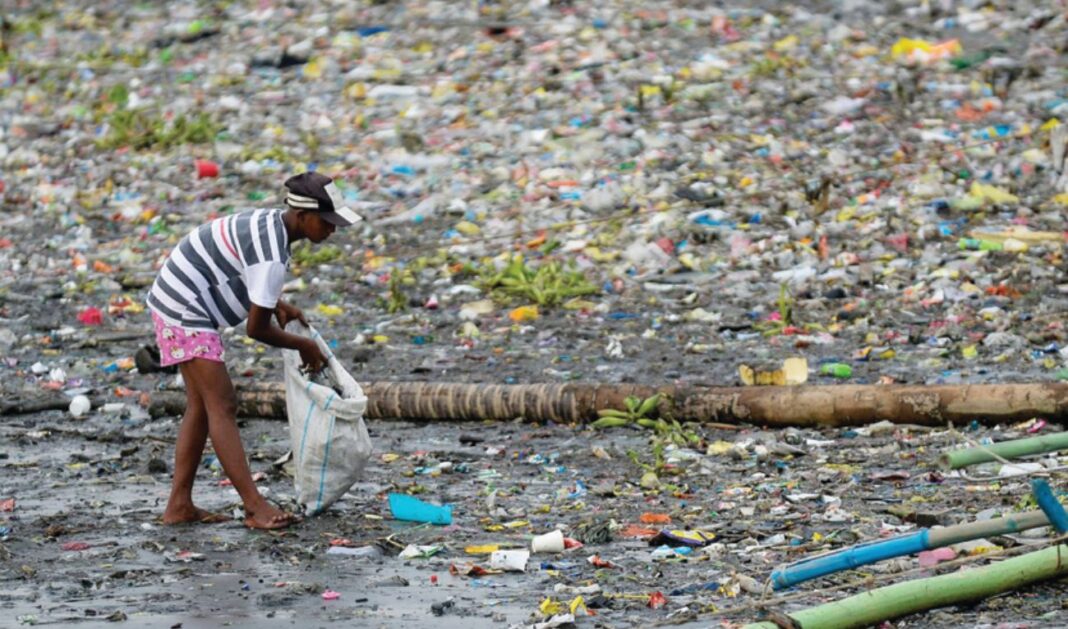MANILA: When President Ferdinand Marcos Jr. delivered his first speech as the newly elected leader of the Philippines at the end of June, he touched on the country’s massive plastic problem.
The Southeast Asian nation was ranked third in the world for failing to deal with its plastic, according to a widely cited 2015 study by the University of Georgia. The Philippines generates about 2.7 million metric tons of plastic garbage annually, 20 percent of which ends up in the ocean.
“We too have our part to play; we are the third biggest plastics polluter in the world,” Marcos had said.
“But we won’t shirk from that responsibility; we will clean up.”
The plastic problem has only grown more recently, with a 2021 study published in the Science Advances journal identifying the Philippines as the largest contributor of plastic waste that ends up in the world’s oceans, emitting more than 356,000 metric tons each year.
Every day, almost 48 million shopping bags are used throughout the Philippines, adding up to about 17.5 billion pieces a year, according to a report by the Global Alliance for Incinerator Alternatives.
In a world grappling with the increasingly devastating impacts of climate change, there has been a renewed urgency to address the plastic crisis in the Philippines.
“The Philippines has a massive plastic pollution problem at the moment, and it’s been a long while coming,” Marian Ledesma, Greenpeace Philippines’ zero waste campaigner, told Arab News.
“It is essential that we act on the plastic crisis right away,” she said. “We need government action as well as the action of large corporations to really shift the tide.”
The Philippines could start by implementing existing laws, Ledesma said, such as the Ecological Solid Waste Management Act of 2000, which critics say has been poorly enforced over the last two decades.
It is also important to reduce the production of single-use plastic and for the government to adopt complementary policies that would help businesses transition to reuse and refill systems, Ledesma added.
Under a new law known as the Extended Producer Responsibility Act, large companies are required to adopt and implement policies for the proper management of plastic packaging wastes, paving a regulatory pathway for the Philippines to combat its plastic pollution problem seriously.
Many environmental groups in the Philippines campaigned to raise more awareness across the country during Plastic Free July, a global movement aimed at real actions to end plastic waste.
Thony Dizon, a chemical safety campaigner with BAN Toxics, told Arab News that finding a solution to the crisis is crucial.
“We really need to address this, we have to find a solution,” Dizon said. “We need action.”
At the individual level, Filipinos should reduce the usage of single-use plastic and switch to alternative materials, such as canvas bags, and bring reusable containers when buying fillable products.
“These are some of the ways to reduce the volume or use of single-use plastic,” Dizon said. “It reaches the main goal, which is to lessen the production and lessen the consumption and throwing away of plastic.”
Plastic waste also contributes to flooding in the Philippines as it clogs drains, he said. Not only does such waste end up in our oceans, but it could also affect our food sources.
Some local governments have moved faster to combat plastic pollution. Quezon City, for example, has banned plastic bags and single-use plastic.
“That’s because they have seen the effects of the problem,” Dizon said. “They have experienced the problem — flooding because of plastic.”
The plastic problem spiraled further during the COVID-19 pandemic as people’s consumption patterns shifted to adapt to life under lockdown and reliance on online deliveries for food and groceries turned into a new normal.
“The pandemic has reshaped people’s shopping behavior,” Dizon said.
“We thought that during the pandemic there would be less volume of plastic waste, but that’s not what happened. Plastic wrappers and packaging from online deliveries added to the problem.”
Filipino lawmakers like Senator Loren Legarda are among those renewing calls to tackle the growing crisis. In July, she pushed for a bill to regulate single-use plastic.
“The plastic crisis we face right now calls for a rethinking of our approaches to our governance and market systems and operations,” Legarda said in a statement.
Though adopting more sustainable practices is important, Legarda said Filipinos also “need to continue demanding more effective policies and solutions” to help address plastic pollution.
Despite calls from environmental groups to highlight the plastic crisis, the issue did not make it to President Marcos’ first state of the nation address in July, which lays out the government’s agenda for the next year.
But in a comprehensive policy speech that outlines plans for growth and development, the 64-year-old leader spoke of the Philippines’ vulnerability to climate change.
“If we cannot mitigate climate change, all our plans for the economy, all our plans for our future, will be for naught,” he said.




